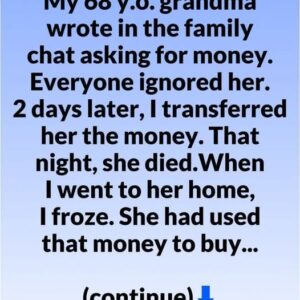My daughter spent weeks crocheting hats for sick children, and the day my husband left for a business trip, everything she worked so hard for disappeared — along with whatever patience I still had for my mother-in-law. By the time my husband returned, he made sure we were never hurt like that again.
For ten years it had been just me and Emma. Her father passed away when she was three, and for years, we lived in this constant rhythm: grief, healing, survival, then finally, peace. When I met Daniel, I was terrified to disturb that peace. But he didn’t disturb anything — he added to it. He and Emma connected almost immediately. He packed her lunches with silly notes, helped her with school projects, braided her hair, and read her favorite stories every night. He stepped into her life with love, not obligation.
But his mother, Carol, never saw Emma that way.
“It’s sweet that you pretend she’s your real daughter,” she said once, right in front of him.
Another time: “Stepchildren never feel like true family. They’ll always remind you they came from someone else.”
And then the one that made my spine turn to ice: “Your daughter must remind you of your wife’s dead husband. That must be difficult.”
Daniel shut her down every time, but the comments never stopped.
We kept our distance. Polite conversations, short visits, nothing more.
We didn’t realize how much distance we needed until she crossed from unpleasant to truly cruel.
Emma had the biggest heart of any child I’ve ever known. Early December, after watching a video about children spending the holidays in hospice care, she told us she wanted to make crochet hats for them — eighty hats, one for every child she could reach.
She taught herself from YouTube tutorials, bought yarn with her allowance, and spent every afternoon practicing, improving, and smiling quietly to herself as she worked. Every completed hat went into a large bag beside her bed. By the time Daniel left for his two-day trip, she had finished seventy-nine. She planned to finish the last one that night.
Daniel’s absence created the perfect opening for Carol.
Whenever he traveled, Carol had this habit of “dropping in.” She never said she was checking up on me, but the timing was always suspicious. I’d stopped trying to understand her intentions.
Emma and I returned from the grocery store that afternoon, arms full of bags, chattering about the icing we needed for gingerbread cookies. She ran to her room to pick colors for hat number eighty.
Five seconds later, she screamed.
I dropped everything and sprinted to her doorway.
Emma was on her knees by her bed, sobbing so hard her whole body shook. The bag of hats — the result of hours of effort, care, and hope — was gone.
Before I could even process it, a calm voice behind me said, “If you’re looking for those raggedy hats, I threw them away.”
Carol was standing there, drinking tea from one of my nicest cups like she was posing for an oil painting titled Casual Cruelty.
“You… what?” My voice came out thin, without breath.
“They were ugly,” she said, shrugging. “And frankly, I don’t understand why you let her spend so much time making things that will only embarrass the family. She isn’t my blood — but even so, she shouldn’t be doing such pointless hobbies.”
“They weren’t pointless,” Emma cried, clinging to me.
Carol rolled her eyes and walked out. No apology. No shame. Just boredom, as if she had tossed out a grocery bag instead of eighty handmade gifts for sick children.
I spent an hour digging through our trash cans, the neighbors’ trash cans, searching gutters, driveways… nothing.
That night Emma cried herself to sleep in my lap.
I stayed with her until her breathing softened, then sat in the living room in the dark, letting my own tears fall only when she couldn’t see.
I almost called Daniel. I typed messages, deleted them, typed again. Finally, I decided to wait — not because I wanted to protect Carol, but because I didn’t want him distracted on the road.
I regretted that choice the moment he walked through the door.
“Where’s my girl?” he called out. “I want to see the hats — did she finish the last one?”
Emma heard the word hats and broke into fresh sobs. Daniel froze. I took him into the kitchen and told him everything — from the screams to the empty trash cans.
By the time I finished, his face had turned into something I’d never seen before. A quiet, focused kind of fury.
Without a word, he went to Emma, pulled her into his chest, kissed her forehead, and whispered, “Sweetheart, I promise — Grandma is never hurting you again. Ever.”
Then he grabbed his keys and left.
Two hours later he returned, his clothes streaked with dirt and something sour-smelling.
He pulled a large garbage bag from the car.
Inside were all eighty hats.
“I searched every dumpster in Mom’s apartment building until I found them,” he said, lifting one of the pastel hats gently. “This isn’t just yarn, Mom. This is her effort. Her kindness. Her heart. And you threw it away.”
An hour later, Carol arrived for her “surprise,” full of smug expectancy.
Daniel handed her the garbage bag and said, calm as ice, “I found them. Every last one.”
Carol wrinkled her nose. “You went dumpster-diving? Daniel, honestly, you’re being dramatic over ugly hats.”
“They’re not ugly,” he said. “But even if they were, you destroyed something our daughter poured her heart into.”
“She’s not your daughter,” Carol snapped.
It was the last mistake she would ever make with him.
Daniel stared at her, the realization settling heavy in his expression. “Get out,” he said. “We’re done.”
Carol sputtered, “Daniel! I’m your mother!”
“And I’m a father,” he said, “to a little girl who deserves better than your cruelty.”
She looked to me as if expecting backup.
I just said, “He’s right.”
She screamed something about us regretting this and slammed the door.
We didn’t regret it.
Not once.
The next day, Daniel arrived home with a huge box for Emma — new yarn, new hooks, gift tags, bubble wrap. “If you want to start over,” he told her, “I’ll learn with you.”
She laughed — honest, relieved laughter — and handed him a crochet hook.
His first hat ended up looking like a lopsided potholder, but he kept trying. Two weeks later, they had eighty hats again.
We mailed them out.
A few days later, the hospice emailed asking to share photos of the kids wearing the hats. Emma said yes, her shy smile glowing like soft light.
The post went viral.
People wrote paragraphs praising her kindness, asking how she learned, calling her “a little hero.”
Emma replied from my account:
“My grandma threw the first ones away, but my daddy helped me make them again.”
That was all it took.
Carol called that evening sobbing.
“People are calling me a monster! They’re messaging me! They’re harassing me! Make them stop!”
Daniel didn’t even flinch. “We didn’t post anything. The hospice did. If you don’t like people knowing what you did… maybe you shouldn’t have done it.”
“You’re bullying me!” she cried.
“No,” he said, “you earned this.”
Emma crochets every weekend now, usually with Daniel beside her. Our home is peaceful again — filled with soft yarn, quiet joy, and the steady click-click of two hooks working side by side.
Carol still texts sometimes, usually on holidays, asking if we can “put this whole thing behind us.”
Daniel replies the same way every time:
“No.”
And in our home, with Emma at the table surrounded by colors of yarn like sunlight, it finally feels like enough.





